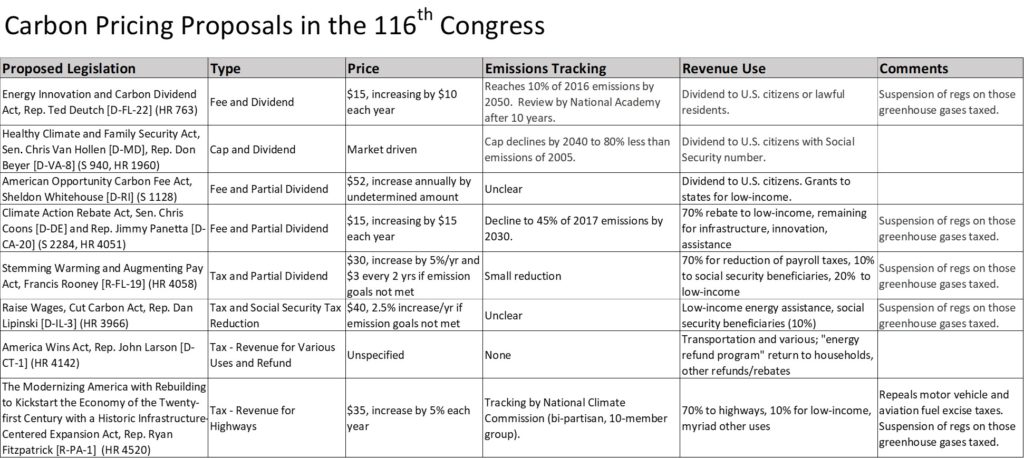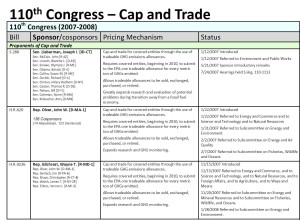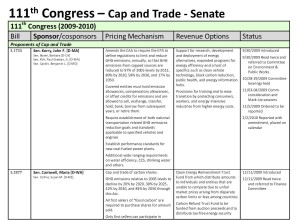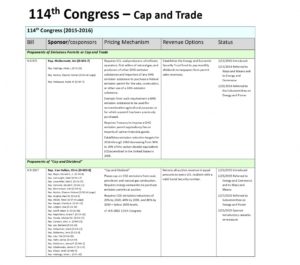Know the Legislation
Carbon pricing has seen a rocky road in the U.S. Congress. 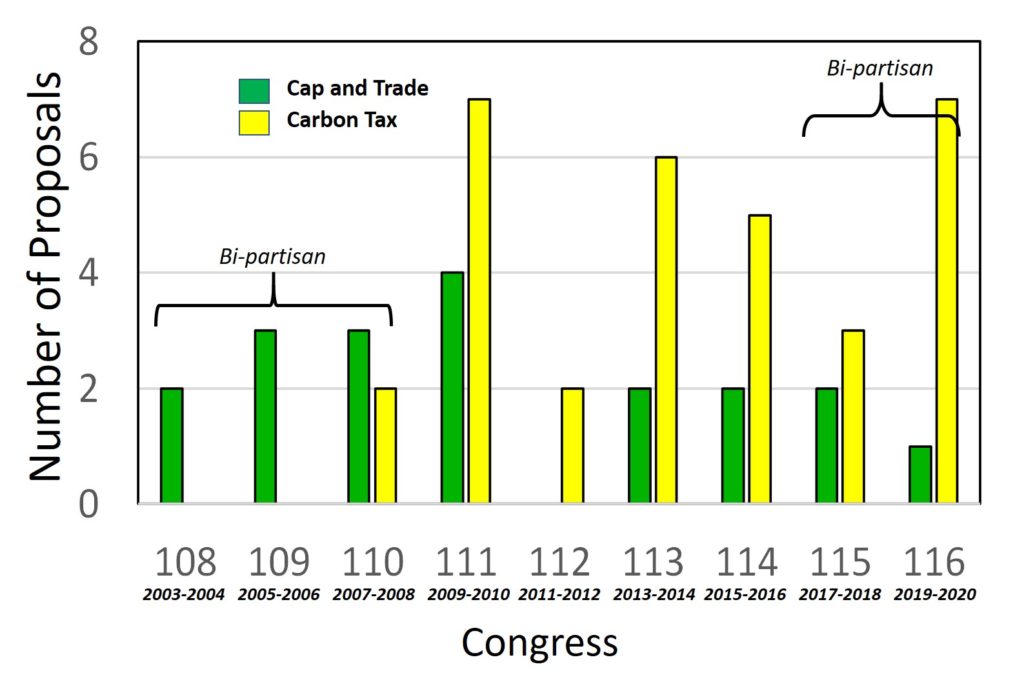 To date, over 50 carbon pricing bills have been introduced. None has passed. The first efforts were bi-partisan, but from 2009 to 2017 polarization set in; Democrats proposed pricing and Republicans strongly opposed it. Cooperation and bi-partisanship are making a comeback. In the current 116th Congress there are eight carbon pricing bills. Four are bi-partisan, and two are actually introduced by Republicans.
To date, over 50 carbon pricing bills have been introduced. None has passed. The first efforts were bi-partisan, but from 2009 to 2017 polarization set in; Democrats proposed pricing and Republicans strongly opposed it. Cooperation and bi-partisanship are making a comeback. In the current 116th Congress there are eight carbon pricing bills. Four are bi-partisan, and two are actually introduced by Republicans.
Carbon Pricing Proposals in 116th Congress
A noticeable difference in the 2019-2020 crop of bills is that the carbon tax (or fee) bills have elements that were previously only in cap and trade, i.e. emissions tracking and offsets.
Although emissions reductions are guaranteed in cap and trade with the declining cap, carbon tax relies on the market to cause emissions decline. Of the proposals for a carbon tax, all but one now have some form of emissions tracking with modifications to the price if emissions goals are not met.
All eight of the carbon tax proposals allow for offsets for carbon capture and sequestration in the form of rebates, refunds, or tax breaks. Offsets were until recently most common to cap and trade; they are critical to provide market incentive to draw greenhouse gases out of the atmosphere. Something we must do with increasing urgency.
History in Brief
Carbon pricing efforts have been around for a long time. After a slow start with proposals as early as 1990, a push with bi-partisan support came in 2003-2008. But by the 111th Congress (2009-2010) Democrats were the primary proponents. There was one exception. In 2009, Bob Inglis [R-SC-4] introduced a carbon tax bill which gained no traction. Inglis – a Republican – was voted out at the next election. But bi-partisan proposals came again in 2018.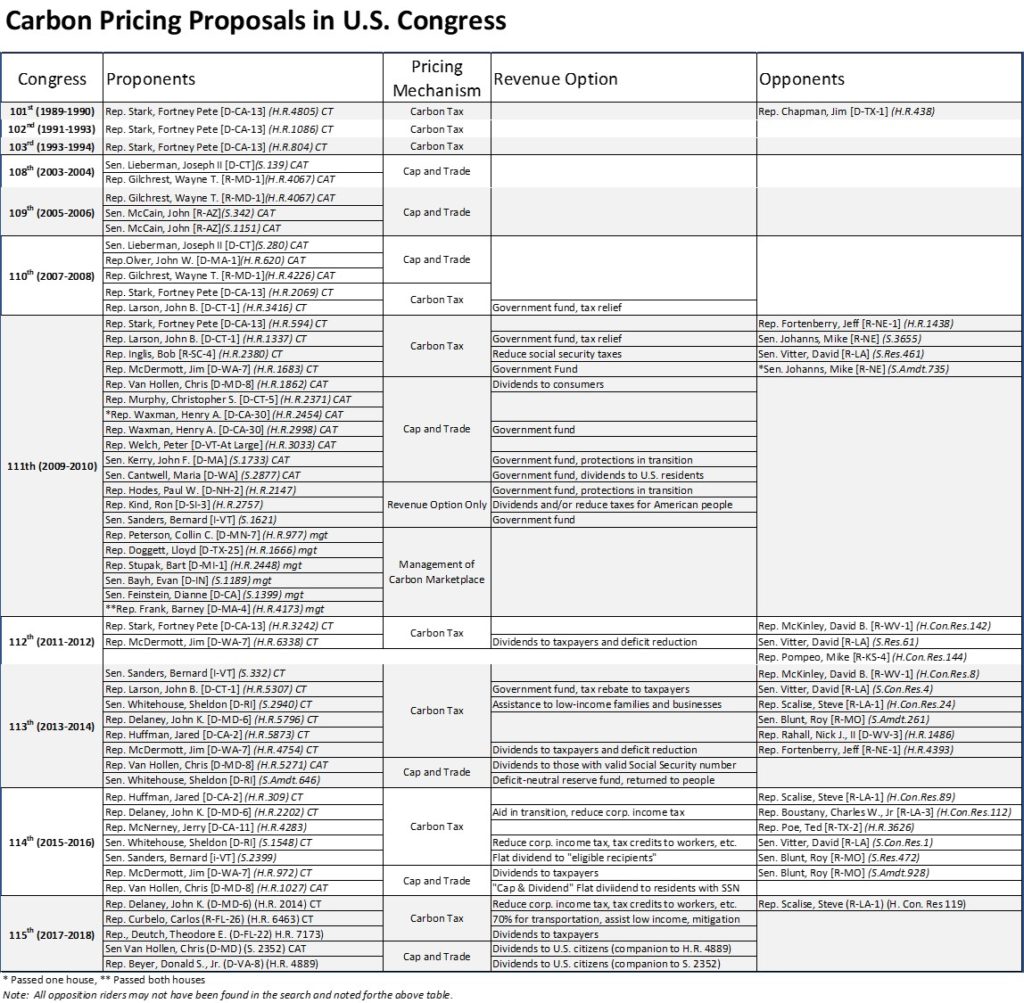
Click on table to enlarge.
The Waxman-Markey cap-and-trade bill came the closest to passing. It passed the House after significant compromising in 2009, but failed in the Senate.
From 2010 to 2016 there was complete polarity, with proposals only introduced and co-sponsored by Democrats. Also opposition increased – all from Republicans.
In 2015 there were signs that some Congressional Republicans began recognizing climate change and moving to find solutions.
Then, in a move long overdue, eight Republicans came forward in February, 2017 with a proposal to the White House for a carbon tax and dividend, including reduction in some existing climate change regulations.
And on July 23, 2018, Representative Carlos Curbelo [R-FL-26] proposed a carbon tax bill. At this writing the bill has two Republican co-sponsors. Curbelo was co-chair of the Climate Solutions Caucus and hopes to spark constructive bi-partisan dialog on carbon pricing in the 115th Congress but was defeated in the 2018 elections.
Near the end of the 115th Congress (2017-2018) H.R. 7173 was proposed by three Republicans and three Democrats to establish a carbon tax with dividends returned to taxpayers. (See more discussion of H.R. 7173 under 115th Congress section below.) S. 3791 was a companion bill but text for the bill was not received as of Jan 4, 2019.
History in More Detail
The first proposal for a price on carbon, in 1990, followed the First Assessment Report by the Intergovernmental Panel on Climate Change (IPCC) which set out some data that climate change may be a threat. Rep. Fortney Pete Stark [D-CA-13] proposed a carbon tax in 1990, 1991 and 1993. There was bi-partisan opposition in 1990 – in fact the majority of cosponsors opposing the resolution were Democrats.
There was an attempt at bi-partisanship in the years 2003-2008. Versions of the Climate Stewardship Act, a cap and trade proposal, were introduced in one or both houses repeatedly, but with no traction. These several bills included the McCain-Leiberman proposals in the Senate and the Gilchrest-Olver proposals in the House.
The IPCC Fourth Assessment in 2007 showed much more compelling evidence of the threat of climate change, and Democrats rallied with twenty-one proposals for a price on carbon or related proposals from 2010 to 2012 (111th Congress). Bob Inglis [R-SC-4] was the sole Republican with a proposal. He lost his next election bid. The Waxman-Markey proposal for cap and trade (H.R.2454) passed the House with a vote of 219-212, but was stopped in committee in the Senate.
Throughout the years 2007 to 2014 the Democratic proposals most typically suggested the revenue be sent to a government fund – each bill suggesting its own creative name for the fund – and/or a proposal to send all or some of the revenue back to the American people. Few of the proposals described how the revenue would be divided among the “American people”.
Polarization into very vigorous “pro” and “con” camps grew from 2010 and continued through the 114th Congress (2014-2016).
Until 2009-2010, opposition was there but not particularly vocal. But that changed. While after 2010 the Democrats trotted out similar carbon pricing proposals to those already tried, Republicans organized strong opposition. There were six Republican proposals to stop carbon pricing in the 113th Congress (2013-2014), one with 155 cosponsors.
The 114th Congress started with a bit of optimism. Two proposals included decreasing corporate income tax as one of the revenue options – a shift toward more business-friendly ideas. But by the end of 2016, the familiar animosity and strong polarization were still evident. But we saw some optimism for two-party talks on carbon pricing with the formation and rapid growth of the Climate Solutions Caucus, with 43 Republicans and 43 Democrats.
And late in the 115th Congress Republican Representative Carlos Curbelo introduced a carbon tax bill, giving hope that constructive bi-partisan dialog may ensue.
Note: There is no guarantee that all proposals related to carbon pricing are covered in this document. Further, in addition to the major proposals listed here there are many “riders” – small paragraphs included typically in budget bills, unrelated to the bill, but valid in law if passed. See a description of examples of 2015 riders.
Early Days
Representative Fortney Pete Stark, a liberal Democrat from California, 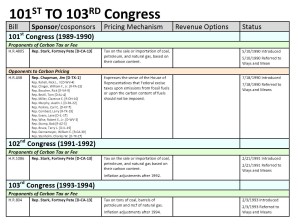 pioneered proposals for a carbon tax, bringing his first proposal to the House in 1990, a very similar proposal in 1991 and again in 1993. The only counter to his proposals was H.R.438 in 1990, brought by Rep. Jim Chapman, a Democrat from Texas, which “expresses the sense of the House of Representative that Federal excise taxes upon emissions from fossil fuels or upon the carbon content of fuels should not be imposed”. Neither of Stark’s proposals nor the opposition proposal made it out of committee. Interestingly the cosponsors of Chapman’s proposal were mostly Democrats — 9 out of 14.
pioneered proposals for a carbon tax, bringing his first proposal to the House in 1990, a very similar proposal in 1991 and again in 1993. The only counter to his proposals was H.R.438 in 1990, brought by Rep. Jim Chapman, a Democrat from Texas, which “expresses the sense of the House of Representative that Federal excise taxes upon emissions from fossil fuels or upon the carbon content of fuels should not be imposed”. Neither of Stark’s proposals nor the opposition proposal made it out of committee. Interestingly the cosponsors of Chapman’s proposal were mostly Democrats — 9 out of 14.
Click on figure to enlarge.
It’s important to remember that in the early 1990s we had little definitive scientific evidence of climate change, and even less that it is caused mostly by human activities. The First Assessment by the Intergovernmental Panel on Climate Change (IPCC) came out in 1990, but the data were far from definitive. But by the Fourth Assessment, which came out in 2007, the data were convincing, although not definitive.
Attempts at Bi-partisanship (2003-2008 – 108th to 110th Congresses)
The Climate Stewardship Act in various forms was introduced five times in the 108th and 109th Congresses: 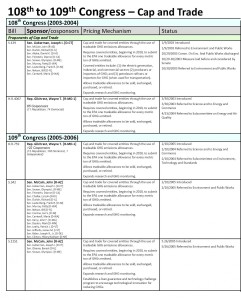 in the Senate in 2003 by Joseph Leiberman [D-CT] (S.139), twice in 2005 by John McCain [R-AZ](S.342, S.1151) and again by Leiberman in 2007 (S.280). A companion, nearly identical bill was introduced in the House by Wayne D. Gilchrest [R-MD-1] in 2003 (H.R.4067),and again in 2005 (H.R.759). The Fourth Assessment of the IPCC came out in 2007, with compelling data that climate change is a genuine problem. The Climate Stewardship Act was reintroduced in the 110th Congress with this additional information: in 2007 a proposal by John Olver [D-MA-1](H.R. 620) and again by Gilchrest (H.R.4226). There were bipartisan cosponsors on all the bills, with up to 136 cosponsors on Olver’s 2007 proposal. None of these proposals discussed how the revenue would be used. None gained traction.
in the Senate in 2003 by Joseph Leiberman [D-CT] (S.139), twice in 2005 by John McCain [R-AZ](S.342, S.1151) and again by Leiberman in 2007 (S.280). A companion, nearly identical bill was introduced in the House by Wayne D. Gilchrest [R-MD-1] in 2003 (H.R.4067),and again in 2005 (H.R.759). The Fourth Assessment of the IPCC came out in 2007, with compelling data that climate change is a genuine problem. The Climate Stewardship Act was reintroduced in the 110th Congress with this additional information: in 2007 a proposal by John Olver [D-MA-1](H.R. 620) and again by Gilchrest (H.R.4226). There were bipartisan cosponsors on all the bills, with up to 136 cosponsors on Olver’s 2007 proposal. None of these proposals discussed how the revenue would be used. None gained traction.
Click on figures to enlarge.
Also in the 110th Congress, Representative Stark again made his proposal for a carbon tax (H.R.2069). As with all his proposals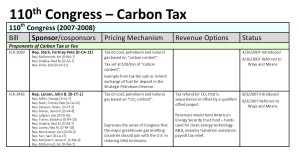 there was no option for how revenues would be spent. Four months later, Representative John B. Larson [D-CT-1] introduced a proposal for a tax on fossil fuels based on carbon content, with revenues to fund “America’s Energy Security Trust Fund” to be used for clean energy technology research and development, industry transition assistance, and payroll tax relief. Neither proposal got out of committee.
there was no option for how revenues would be spent. Four months later, Representative John B. Larson [D-CT-1] introduced a proposal for a tax on fossil fuels based on carbon content, with revenues to fund “America’s Energy Security Trust Fund” to be used for clean energy technology research and development, industry transition assistance, and payroll tax relief. Neither proposal got out of committee.
Click on figure to enlarge.
The Action Heats Up: 111th Congress (2009-2010)
By the 111th Congress (2009-2010), the IPCC Fourth Assessment had been better examined and discussed, and many saw the need for a price on carbon. A total of twenty-one proposals related to carbon pricing or revenue options were proposed: three proposals for a carbon tax or fee, nine for cap and trade or emission permits, six proposals for ways to manage a carbon marketplace, and three proposing only how to use revenues, but offering no option for a pricing mechanism. All proposals were offered by Democrats.
Carbon Tax or Fee
Once again, Representatives Stark and Larson proposed legislation for a carbon tax with H.R.594 and H.R.1337 respectively. Representative Larson changed his proposal for use of the revenue slightly, offering instead of payroll tax relief as proposed in 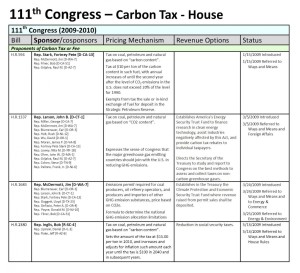 the 110th Congress, proposing to provide carbon tax rebates to individual taxpayers.
the 110th Congress, proposing to provide carbon tax rebates to individual taxpayers.
Click on figure to enlarge.
Rep. Bob Inglis, a Republican from South Carolina, also proposed a tax on fossil fuels based on carbon content, with the tax set at $15/ton of carbon dioxide equivalent (CO2e) to increase each year such that the tax reached $100/ton in 2040 with inflation increases continuing. This was a break from the Republican’s strongly held position opposing carbon taxes. In 2010 Representative Inglis lost his bid for re-election, faced with the Republican backlash to his proposal. Rep. Inglis continues to favor a price on carbon and is trying to marshal Republicans to his view.
Two of the proposals specified requiring emissions “permits” or “allowances” but did not define a declining cap and had no specifications for trading (McDermott H.R.1683 and Inslee H.R.1759). In both proposals the government sets the price in order to cause the emissions to decline, so although the emissions permits as described are a cap they act essentially as a tax or fee. None of the proposals made it past committee.
Cap and Trade
Five proposals describing varying degrees of specifics were raised in the House. One proposal — the Waxman-Markey Bill (H.R.2454) proposing a cap and trade system, moved out of committee to the floor the the House. The proposal was strongly supported by President Obama, but in order to get sufficient votes in the House, the proponents of the Bill negotiated a series of compromises, some arguably “pork”. It passed the House by a vote of 219 to 212, but stalled in the Senate.
The Waxman-Markey Bill, although detailed in the pricing mechanism and trading, and miscellaneous additions, did not offer specifics on revenue options.
Two proposals were raised in the Senate, including a bewilderingly complex proposal by John Kerry (S.1733). Neither passed.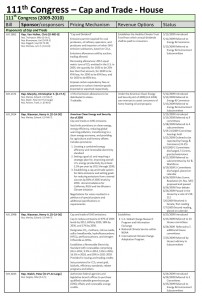
Click on figure to enlarge.
Click on figure to enlarge.
Revenue Option Only
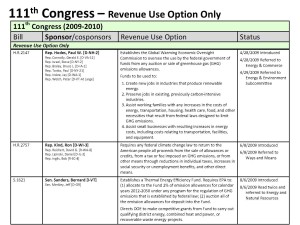 Three proposals in the 100th Congress were for a revenue option only. These included a proposal by Representative Hodes [D-NY-2] with an array of uses for funds to be allocated by the “Global Warming Economic Oversight Commission”: new jobs in renewables, preserve jobs in carbon-intensive industries, assist working families, and assist small businesses. Representative Kinds [D-WI-3] proposed returning all revenues to the American people through tax reductions, increase in social security or unemployment benefits and other means. Senator Bernie Sanders [I-VT] proposed a “Thermal Energy Efficiency Fund” from which the Department of Energy would offer competitive grants.
Three proposals in the 100th Congress were for a revenue option only. These included a proposal by Representative Hodes [D-NY-2] with an array of uses for funds to be allocated by the “Global Warming Economic Oversight Commission”: new jobs in renewables, preserve jobs in carbon-intensive industries, assist working families, and assist small businesses. Representative Kinds [D-WI-3] proposed returning all revenues to the American people through tax reductions, increase in social security or unemployment benefits and other means. Senator Bernie Sanders [I-VT] proposed a “Thermal Energy Efficiency Fund” from which the Department of Energy would offer competitive grants.
Management of the Carbon Marketplace
Five proposals were concerned with how to manage a carbon
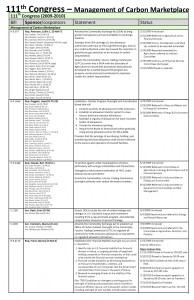 marketplace, assuming trading of permits or allowances by some method would eventually happen. All five proposals showed a concern that there needed to be assurance of transparency, accountability, and fairness in the market. All five were proposed in 2009, following the 2008 “bubble burst” and start of the Great Recession. Four of the five died in committee, but Peterson (H.R.977) made it to the calendar and then died.
marketplace, assuming trading of permits or allowances by some method would eventually happen. All five proposals showed a concern that there needed to be assurance of transparency, accountability, and fairness in the market. All five were proposed in 2009, following the 2008 “bubble burst” and start of the Great Recession. Four of the five died in committee, but Peterson (H.R.977) made it to the calendar and then died.
Click on figure to enlarge.
A proposal by Barney Frank [D-MA-4] (H.R.4173 Dodd-Frank) was also a response to the market drop. H.R.4173 established the “Financial Stability Oversight Council” which was tasked to (1) identify risks to U.S. financial stability, (2) promote market discipline, and (3) respond to emerging threats. This bill passed both houses, was signed by the President and on July 21, 2010 became Public Law No: 111-203. Deep within the bill, Section 750 “establishes an interagency working group for oversight of existing and prospective carbon markets to ensure an efficient, secure, and transparent carbon market, including oversight of spot markets and derivative markets”.
Opposition to Price on Carbon
The opposition was not quiet in the 111th Congress. Rep. Jeff Fortenberry {R.NE-1] introduced a prohibition against imposing a fee or tax 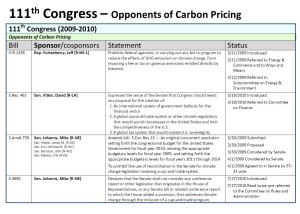 on gaseous emissions emitted directly by livestock. Sen. Mike Johanns [R-NE] proposed a declaration that the “Senate shall not consider any … legislation … that addresses climate change through the inclusion of a cap and trade program”. Sen. David Vitter [R-LA] used stronger language “expressing the sense of the Senate that Congress should reject any proposal for the creation of … a global cap and trade system or other climate regulations that would punish businesses in the United States and limit the competitiveness of the U.S….” None of those three proposals passed. However, Sen. Mike Johanns also introduced S.Amdt.735 amending S.Con.Res.13 (congressional budget for FY 2010) “to prohibit the use of reconciliation in the Senate for climate change legislation involving a cap and trade system.” S.Amdt.735 did pass in the Senate by a 67-31 vote.
on gaseous emissions emitted directly by livestock. Sen. Mike Johanns [R-NE] proposed a declaration that the “Senate shall not consider any … legislation … that addresses climate change through the inclusion of a cap and trade program”. Sen. David Vitter [R-LA] used stronger language “expressing the sense of the Senate that Congress should reject any proposal for the creation of … a global cap and trade system or other climate regulations that would punish businesses in the United States and limit the competitiveness of the U.S….” None of those three proposals passed. However, Sen. Mike Johanns also introduced S.Amdt.735 amending S.Con.Res.13 (congressional budget for FY 2010) “to prohibit the use of reconciliation in the Senate for climate change legislation involving a cap and trade system.” S.Amdt.735 did pass in the Senate by a 67-31 vote.
Related Legislation
Legislation related to carbon pricing includes compensation for owners and operators of facilities in eligible domestic 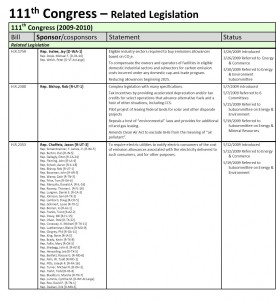 industrial sectors and subsectors for carbon emission costs incurred under any domestic cap-and-trade program(Inslee [D-WA-1] H.R.1759), a complex measure with tax incentives for alternative fuels and repeal of several “environmental” laws (Bishop [R-UT-1] H.R.2300), and a measure to require electric utilities to notify consumers of the cost of emission allowances (Chaffetz [R-Ut-3] H.R.2353). None of these proposals made it past committee.
industrial sectors and subsectors for carbon emission costs incurred under any domestic cap-and-trade program(Inslee [D-WA-1] H.R.1759), a complex measure with tax incentives for alternative fuels and repeal of several “environmental” laws (Bishop [R-UT-1] H.R.2300), and a measure to require electric utilities to notify consumers of the cost of emission allowances (Chaffetz [R-Ut-3] H.R.2353). None of these proposals made it past committee.
Polarization Solidifies
In the 112th and 113th Congresses opposition increased and bi-partisan polarization became entrenched. Proponents fell back, but opposition increased.
112th Congress – Proponents of Price on Carbon
We saw the return of Rep. Fortney Pete Stark 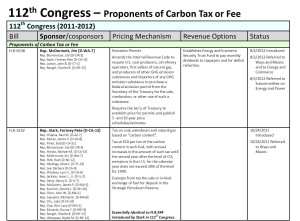 with H.R. 3242 which was essentially the same as his proposal in the 111th Congress (H.R.594). This time, however, Rep. Stark had a much longer list of cosponsors (25). Also, once again, Rep. Jim McDermott proposed a version of emission permits (H.R.6338) as he had done in the previous Congress. Neither made it past the committees. All sponsors and cosponsors were Democrats.
with H.R. 3242 which was essentially the same as his proposal in the 111th Congress (H.R.594). This time, however, Rep. Stark had a much longer list of cosponsors (25). Also, once again, Rep. Jim McDermott proposed a version of emission permits (H.R.6338) as he had done in the previous Congress. Neither made it past the committees. All sponsors and cosponsors were Democrats.
112th Congress – Opponents of Price on Carbon
Opposition stepped up their game in the 112th Congress. Although only three proposals were raised in opposition, there was an impressive number of cosponsors lining up behind them. All three proposals expressed “the opposition of Congress to federal efforts to establish a carbon tax…” (H.Con.Res.142), “express the sense of Congress that a carbon tax would be a detrimental to 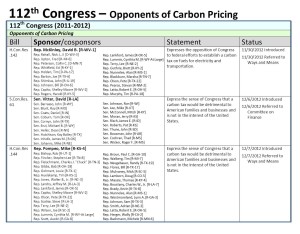 American families and businesses…”(S.Con.Res.61) and again “express the sense of Congress that a carbon tax would be detrimental to American families and business…” (H.Con.Res.144). None passed. Of the 75 sponsors and cosponsors 72 were Republicans, 3 were Democrats.
American families and businesses…”(S.Con.Res.61) and again “express the sense of Congress that a carbon tax would be detrimental to American families and business…” (H.Con.Res.144). None passed. Of the 75 sponsors and cosponsors 72 were Republicans, 3 were Democrats.
113th Congress – Proponents of Price on Carbon
The Democrats continued to push for a price on carbon, but their offers of how revenue 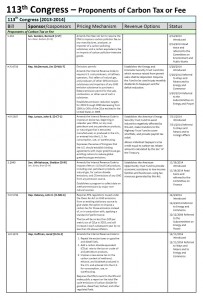 should be used continued along the same lines proposed in previous Congresses. With few exceptions, proposals had been for a government fund to be allocated to projects by the government, and/or returning the revenue to the American people through tax relief, Social Security, or other means. Notable exceptions included a 2007 proposal by John B. Larson [D-CT-1] which included among revenue uses research and development, industry transition assistance, and payroll tax relief (H.R.3416), and proposals s by
should be used continued along the same lines proposed in previous Congresses. With few exceptions, proposals had been for a government fund to be allocated to projects by the government, and/or returning the revenue to the American people through tax relief, Social Security, or other means. Notable exceptions included a 2007 proposal by John B. Larson [D-CT-1] which included among revenue uses research and development, industry transition assistance, and payroll tax relief (H.R.3416), and proposals s by 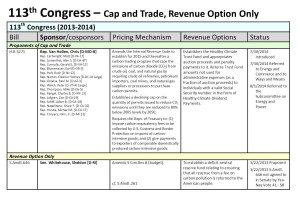 Jim McDermott in the 112th Congress (H.R.6338) and in the 113th Congress (H.R.4754) which propose that revenue be used to return dividends to taxpayers and for deficit reduction. In the majority, however, if revenue options were offered at all, they followed the previous pattern: Larson [D-CT-1] (H.R.5307) – government fund and tax rebate to taxpayers; Whitehouse [D-RI] (S.2940) – assistance to low-income families and businesses; McDermott [D-WA-7] – dividends to taxpayers and deficit reduction; Van Hollen [D-MD-8] dividends to those with a valid Social Security number; and Whitehouse [D-RI] (S.Amdt.646) – “deficit-neutral” reserve fund and revenue returned to people.
Jim McDermott in the 112th Congress (H.R.6338) and in the 113th Congress (H.R.4754) which propose that revenue be used to return dividends to taxpayers and for deficit reduction. In the majority, however, if revenue options were offered at all, they followed the previous pattern: Larson [D-CT-1] (H.R.5307) – government fund and tax rebate to taxpayers; Whitehouse [D-RI] (S.2940) – assistance to low-income families and businesses; McDermott [D-WA-7] – dividends to taxpayers and deficit reduction; Van Hollen [D-MD-8] dividends to those with a valid Social Security number; and Whitehouse [D-RI] (S.Amdt.646) – “deficit-neutral” reserve fund and revenue returned to people.
113th Congress – Opponents of Price on Carbon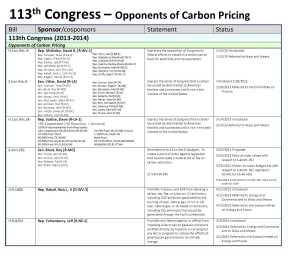
The opponents of carbon pricing spoke more loudly and in larger numbers in the 113th Congress. Six proposals were brought forward in opposition, including H.Con.Res.24 sponsored by Steve Scalise [R-LA-1], which expressed “the sense of Congress that a carbon tax would be detrimental to American families and businesses and is not in the best interest of the United States”. Scalise’s proposal boasted 155 cosponsors. Only one Democrat joined the otherwise 100% Republican outcry: Nick, J. Rahall, a Democrat from West Virginia – a coal state.
Click on figure to enlarge.
113th Congress – Related Legislation
Companion measures were introduced in the House (Huffman [D-CA-2] H.R.5733) and Senate (Sanders [I-VT] S.2905) requiring the Director of the Congressional Budget Office (CBO) to calculate a carbon score for legislation reflecting the net GHG emissions that would result from such legislation. And directs the CBO to include the carbon score when carrying out provisions of the Congressional Budget Act of 1974 requiring a cost estimate for each bill or resolution reported by any congressional committee except the appropriations committees. Neither survived Committees.
114th Congress – Not Much Change
In this Congress we see a very small change in the proposals offered by the Democrats. Both 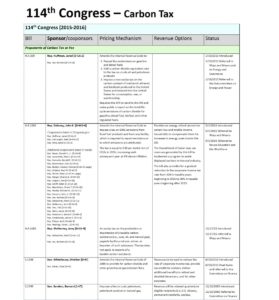 Delaney [D-MD-6] (H.R.2202) and Whitehouse [D-RI] (S.1548) have added a proposal to reduce corporate income tax to their revenue options. Senator Whitehouse openly stresses that the revenue options in his bill are meant to draw bi-partisan support. These efforts represent, perhaps, a real effort to seek a compromise plan which can garner bi-partisan support.
Delaney [D-MD-6] (H.R.2202) and Whitehouse [D-RI] (S.1548) have added a proposal to reduce corporate income tax to their revenue options. Senator Whitehouse openly stresses that the revenue options in his bill are meant to draw bi-partisan support. These efforts represent, perhaps, a real effort to seek a compromise plan which can garner bi-partisan support.
Two other Democratic proposed revenue options are a repeat of proposals in former Congresses. Rep. Jim McDermott [D-WA-7] (H.R.4754] is essentially the same as his proposals in the 111th, 112th and 113th Congresses. Rep. Chris Van Hollen [D-MD-8] also repeated the essentials of his proposals in the 111th and 113th Congresses.
114th Congress – Opponents to Price on Carbon
In this Congress there is the same objection as in previous Congresses,.Again by Senator David Vitter [R-LA] weighed in; he alsos submitted similar proposals opposing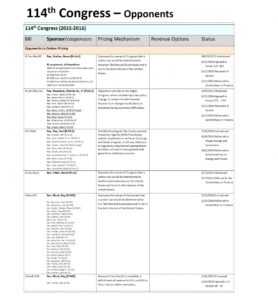 a price on carbon in the 111th, 112th, and 113th Congresses.
a price on carbon in the 111th, 112th, and 113th Congresses.
In addition to continued opposition to price on carbon, there is also opposition to allow the Social Cost of Carbon to be used in any rule-making or other actions. That restriction was stated in one form or another in six proposed actions (HR 5538, HR 5668, H.Amdt.1117 to H.R.5055, S.156, H.Amdt.571 to H.R.2822, and H.R.4035).
Only H.R. 5538 passed. Section 433 “Prohibits funds from being used to incorporate the social cost of carbon into any rulemaking or guidance document until a new Interagency Working Group makes specified revisions to the estimates.” An attempt was made to strike the section (H.Amdt.1307) but it failed by a vote of 185-241.
Climate Solutions Caucus
The Climate Solutions Caucus was founded in February 2016 by two Florida Representatives: Rep Carlos Curbelo (R-FL-26) and Rep Ted Deutsch (D-FL-21) to educate house members on economically-viable options to reduce climate risk. It has thrived and now has a total of 86 members, divided equally among Republicans and Democrats.
115th Congress – A Return to Bi-partisan Solutions?
The 115th Congress had repeats of former bills. Rep. Delaney continued the partisan approach with H.R. 2014, The Tax Pollution Not Profits Act, another proposal for a carbon tax. And companion bills by Senator Van Hollen (S. 2352) and by Rep. Beyer (H.R. 4889) call again for “cap and dividend”. And Rep. Steve Scalise [R-LA-1} for the third time pushed through a resolution opposing carbon pricing (H.Con.Res. 119).
Republicans Come Back to the Table
On July 23, 2018, Representative Carlos Curbelo [R-FL-26] introduced H.R.6463, the Market Choice Act. It calls for a tax of $24/metric tonne of CO2e, beginning in 2020; increasing annually by 2% plus the Consumer Price Index. The current gas tax would be suspended, plus place a rolling moratorium on EPA regulations on greenhouse gases. The bill allows for modifications if emissions reductions are not on target. Modeling shows that emissions would decrease of 27-32 percent by 2025, and 30-40 percent by 2030 (relative to 2005). Revenue would be invested primarily (70%) in transportation infrastructure, with the remainder used for climate mitigation and adaptation projects, research, assistance to displaced workers and to low-income families.
Rep. Curbelo stresses that H.R.6463 is designed to foster constructive dialog across party lines to reach agreement on carbon pricing. There is no expectation that the legislation will pass in this Congress, but it will begin a conversation to address climate. Rep. Curbelo was defeated in the 2018 election.
At the end of November, Rep. Ted Deutch who co-chaired the Climate Solutions Caucus with Rep. Curbelo, proposed H.R. 7173. Co-sponsors of the bill include 3 Democrats (including Deutch) and 3 Republicans. The bill would establish a carbon tax of $15 per tonne of CO2e, increasing by $10 every year. Dividends would be paid to taxpayers. missions reductions would be monitored and compared to targets, and within 10 years, the National Academy of Sciences would evaluate emissions reductions and adjust the fee schedule as needed. A companion bill, S. 3791 was proposed by Senator Chris Coons, but text is still not available.
Climate Leadership Council
Eight senior Republicans proposed a carbon tax and dividend, which they call a “Carbon Dividends Plan” in February, 2017, but no legislation is pending. The plan includes a tax on CO2 emissions only, steadily increasing from $40/ton CO2; a dividend to all Americans, and a roll-back of regulations put in place by the EPA, such as the Clean Power Plan, and release of tort liability for emitters.
Other Efforts
Representative John Delaney (D-MD-6) proposed H.R. 2326 – Climate Solutions Commission Act – to form a bi-partisan commission to “undertake a comprehensive review of economically viable public and private actions or policies to reduce greenhouse gas emissions in the United States”. The co-sponsors include seven Republicans and six Democrats.
Disclaimer: There is no guarantee that all bills, resolutions, amendments or riders have been found in the search. Please let us know of any information which is incorrect or missing from this page.
Last update: March 10, 2020

